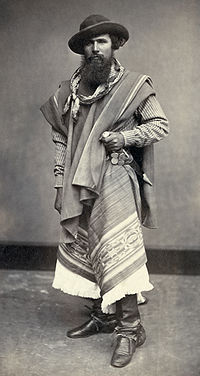
Back غاوتشو Arabic Гаучо Bulgarian গাউচো Bengali/Bangla Gautxo Catalan Gawtso CEB Gaučo Czech Gaucho CY Gaucho German Γκάουτσο Greek Gaŭĉo EO

A gaucho (Spanish: [ˈɡawtʃo]) or gaúcho (Portuguese: [ɡaˈuʃu]) is a skilled horseman, reputed to be brave and unruly. The figure of the gaucho is a folk symbol of Argentina, Paraguay,[1] Uruguay, Rio Grande do Sul in Brazil, the southern part of Bolivia,[2] and the south of Chilean Patagonia.[3] Gauchos became greatly admired and renowned in legend, folklore, and literature and became an important part of their regional cultural tradition. Beginning late in the 19th century, after the heyday of the gauchos, they were celebrated by South American writers.
According to the Diccionario de la lengua española, in its historical sense a gaucho was a "mestizo who, in the 18th and 19th centuries, inhabited Argentina, Uruguay, and Rio Grande do Sul in Brazil, and was a migratory horseman, and adept in cattle work".[4] In Argentina and Uruguay today, gaucho can refer to any "country person, experienced in traditional livestock farming".[4] Because historical gauchos were reputed to be brave, if unruly, the word is also applied metaphorically to mean "noble, brave and generous", but also "one who is skillful in subtle tricks, crafty".[4] In Portuguese the word gaúcho means "an inhabitant of the plains of Rio Grande do Sul or the Pampas of Argentina of European and indigenous American descent who devotes himself to lassoing and raising cattle and horses"; gaúcho has also acquired a metonymic signification in Brazil, meaning anyone, even an urban dweller, who is a citizen of the state of Rio Grande do Sul.[5][6]
- ^ "Folklore Paraguayo" [Paraguayan Folklore]. Ministerio de Relaciones Exteriores del Paraguay (in Spanish). August 22, 2022. Retrieved 2024-07-17.
- ^ Tribuno, El. "El Tribuno". El Tribuno.
- ^ Fuller 2014; Holmes, "Nomad Cowboys"; Slatta 1990, p. 31.
- ^ a b c DLE, "gaucho, gaucha".
- ^ Dicionário Online Priberam de Português, "gaúcho".
- ^ Oliven 2000, p. 129.